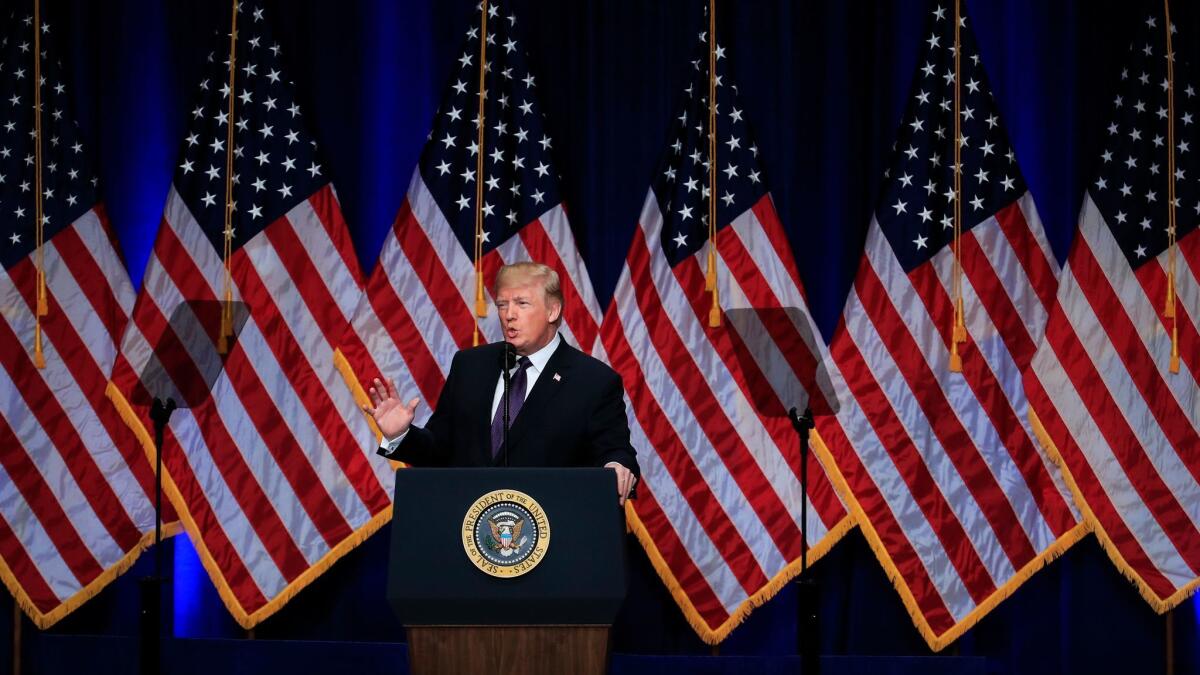Column: A year of chaos, division and disruption in national politics

- Share via
Change came to Washington in 2017, as the new president promised.
So did chaos, division and disruption, and a sense that the guardrails that usually had kept the capital and American politics on a normal path had collapsed under the weight of it all.
A year that started with a bleak inaugural address in which President Trump spoke of “American carnage” and his angry insistence that he’d drawn the greatest crowd of supporters ever to watch a swearing-in ended with the president venting publicly at the FBI, his own Justice Department and, in what became a common refrain, at his predecessor, President Obama, and his defeated opponent, Hillary Clinton.
All year, the capital and, by extension, politics at large have been roiled by multiple investigations into Russia’s interference in the 2016 election, questions of whether the Trump campaign was also involved, massive protests, a president whose moods could be transparently ascertained in 140-character bites, rancor on Capitol Hill and discontent in Trump’s own administration.
On Capitol Hill, Democrats and Republicans have been thoroughly alienated from each other, as Republicans forge ahead alone on goals long thwarted by Obama, only to find themselves cobbled by internal warfare, while Democrats watch and contemplate their own brewing civil war.
By the end of the year, for many there was a palpable fear of what was to come on matters as diverse as the Cold War-reminiscent dispute with North Korea and the specter of sexual harassment allegations tarring politicians of both major parties.
Trump’s presidency has echoed the curvature of his campaign, with a histrionic public facade that fronts an administration that does manage to get some things done.
Trump has begun to reshape the federal judiciary in conservative fashion, impacts that will be felt for decades given judges’ lifetime appointments. He has curbed regulations on a variety of fronts, many of them aiding industries that have long complained about restrictions, and has benefited from an economy that, continuing the long trend begun under Obama, has soared.
He has begun walking back trade deals reached by his predecessors, including the Trans-Pacific Partnership. He has altered long-standing, bipartisan foreign policy goals, including his December announcement that he would move the U.S. Embassy in Israel to Jerusalem and his soft touch toward Russia.
But apart from the Pacific trade deal, those were nowhere near the top of the bullet points he fired off night after night in campaign rallies filled with adoring fans.
The wall meant to block illegal immigration? Nowhere near funded. Obamacare repealed? Nope. China labeled a money manipulator and punished? Not at all. The swamp of Washington drained? It’s deeper and more brackish. Wall Street punished for plundering middle America? To the contrary, it was rewarded with Cabinet positions and a promising tax plan.
As 2017 closes, America is no closer than it was at the year’s beginning to be able to answer some basic questions about the president’s approach, so often scattershot, and his odds of forging a presidency whose accomplishments might still some of the national discontent.
From the start of his campaign until now, Trump has succeeded thanks to an overt usage of us-versus-them, fueling the anger of his loyal base of roughly 35% of Americans against those he’s attacked: Muslims, Latinos, women who have accused him of sexual misconduct, Gold Star families, African American athletes, Republicans who don’t genuflect to him, Democrats of all stripes, and always, always, Clinton and Obama.
But like chaos, anger blows past boundaries. Already, Trump’s presidency has set off a fierce backlash that has improved Democratic chances in the 2018 elections. The question — of enormous import for 2018 and Trump’s reelection odds in 2020 — is whether he can contain something he helped unleash.
Twitter: @cathleendecker
More to Read
Get the L.A. Times Politics newsletter
Deeply reported insights into legislation, politics and policy from Sacramento, Washington and beyond. In your inbox twice per week.
You may occasionally receive promotional content from the Los Angeles Times.











